Entrepreneurship and Small Business Management
VerifiedAdded on 2023/06/18
|11
|2975
|450
AI Summary
This report covers different types of entrepreneurial ventures, their impact on the economy, skills and traits of successful entrepreneurs, and how background and experience can hinder or foster entrepreneurship. It also discusses the importance of small businesses and start-ups to the growth of the social economy.
Contribute Materials
Your contribution can guide someone’s learning journey. Share your
documents today.

Entrepreneurship and
Small Business
Management
Small Business
Management
Secure Best Marks with AI Grader
Need help grading? Try our AI Grader for instant feedback on your assignments.
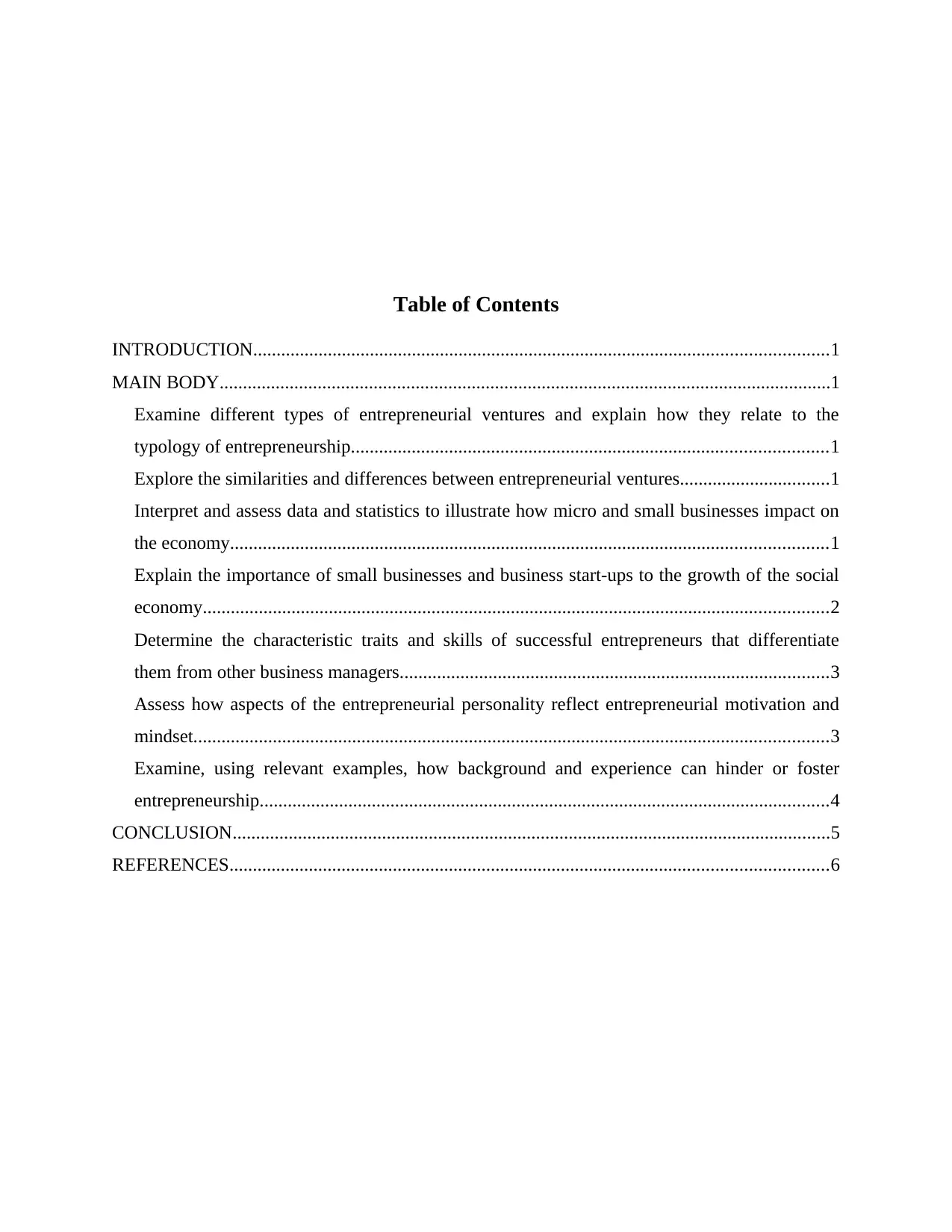
Table of Contents
INTRODUCTION...........................................................................................................................1
MAIN BODY...................................................................................................................................1
Examine different types of entrepreneurial ventures and explain how they relate to the
typology of entrepreneurship......................................................................................................1
Explore the similarities and differences between entrepreneurial ventures................................1
Interpret and assess data and statistics to illustrate how micro and small businesses impact on
the economy................................................................................................................................1
Explain the importance of small businesses and business start-ups to the growth of the social
economy......................................................................................................................................2
Determine the characteristic traits and skills of successful entrepreneurs that differentiate
them from other business managers............................................................................................3
Assess how aspects of the entrepreneurial personality reflect entrepreneurial motivation and
mindset........................................................................................................................................3
Examine, using relevant examples, how background and experience can hinder or foster
entrepreneurship..........................................................................................................................4
CONCLUSION................................................................................................................................5
REFERENCES................................................................................................................................6
INTRODUCTION...........................................................................................................................1
MAIN BODY...................................................................................................................................1
Examine different types of entrepreneurial ventures and explain how they relate to the
typology of entrepreneurship......................................................................................................1
Explore the similarities and differences between entrepreneurial ventures................................1
Interpret and assess data and statistics to illustrate how micro and small businesses impact on
the economy................................................................................................................................1
Explain the importance of small businesses and business start-ups to the growth of the social
economy......................................................................................................................................2
Determine the characteristic traits and skills of successful entrepreneurs that differentiate
them from other business managers............................................................................................3
Assess how aspects of the entrepreneurial personality reflect entrepreneurial motivation and
mindset........................................................................................................................................3
Examine, using relevant examples, how background and experience can hinder or foster
entrepreneurship..........................................................................................................................4
CONCLUSION................................................................................................................................5
REFERENCES................................................................................................................................6
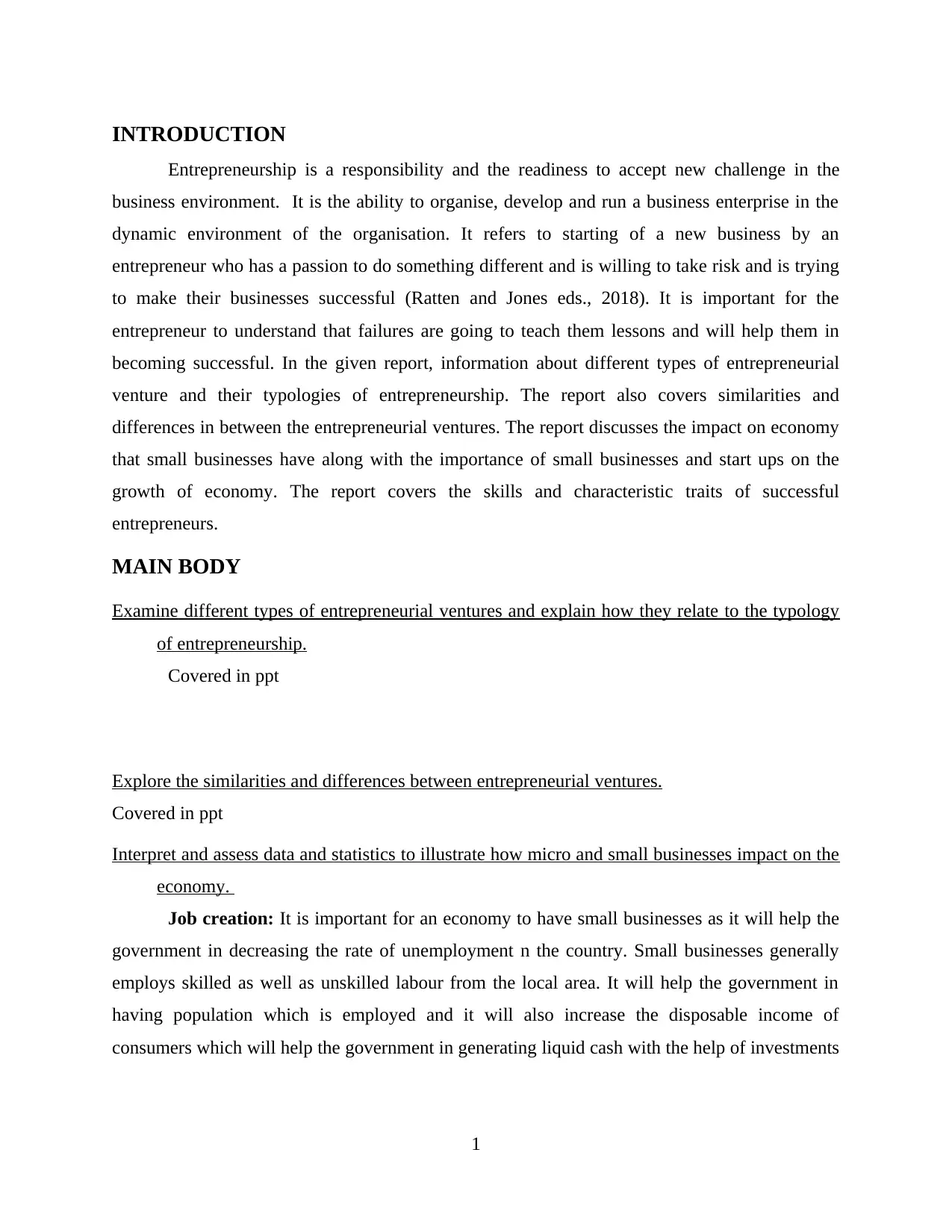
INTRODUCTION
Entrepreneurship is a responsibility and the readiness to accept new challenge in the
business environment. It is the ability to organise, develop and run a business enterprise in the
dynamic environment of the organisation. It refers to starting of a new business by an
entrepreneur who has a passion to do something different and is willing to take risk and is trying
to make their businesses successful (Ratten and Jones eds., 2018). It is important for the
entrepreneur to understand that failures are going to teach them lessons and will help them in
becoming successful. In the given report, information about different types of entrepreneurial
venture and their typologies of entrepreneurship. The report also covers similarities and
differences in between the entrepreneurial ventures. The report discusses the impact on economy
that small businesses have along with the importance of small businesses and start ups on the
growth of economy. The report covers the skills and characteristic traits of successful
entrepreneurs.
MAIN BODY
Examine different types of entrepreneurial ventures and explain how they relate to the typology
of entrepreneurship.
Covered in ppt
Explore the similarities and differences between entrepreneurial ventures.
Covered in ppt
Interpret and assess data and statistics to illustrate how micro and small businesses impact on the
economy.
Job creation: It is important for an economy to have small businesses as it will help the
government in decreasing the rate of unemployment n the country. Small businesses generally
employs skilled as well as unskilled labour from the local area. It will help the government in
having population which is employed and it will also increase the disposable income of
consumers which will help the government in generating liquid cash with the help of investments
1
Entrepreneurship is a responsibility and the readiness to accept new challenge in the
business environment. It is the ability to organise, develop and run a business enterprise in the
dynamic environment of the organisation. It refers to starting of a new business by an
entrepreneur who has a passion to do something different and is willing to take risk and is trying
to make their businesses successful (Ratten and Jones eds., 2018). It is important for the
entrepreneur to understand that failures are going to teach them lessons and will help them in
becoming successful. In the given report, information about different types of entrepreneurial
venture and their typologies of entrepreneurship. The report also covers similarities and
differences in between the entrepreneurial ventures. The report discusses the impact on economy
that small businesses have along with the importance of small businesses and start ups on the
growth of economy. The report covers the skills and characteristic traits of successful
entrepreneurs.
MAIN BODY
Examine different types of entrepreneurial ventures and explain how they relate to the typology
of entrepreneurship.
Covered in ppt
Explore the similarities and differences between entrepreneurial ventures.
Covered in ppt
Interpret and assess data and statistics to illustrate how micro and small businesses impact on the
economy.
Job creation: It is important for an economy to have small businesses as it will help the
government in decreasing the rate of unemployment n the country. Small businesses generally
employs skilled as well as unskilled labour from the local area. It will help the government in
having population which is employed and it will also increase the disposable income of
consumers which will help the government in generating liquid cash with the help of investments
1
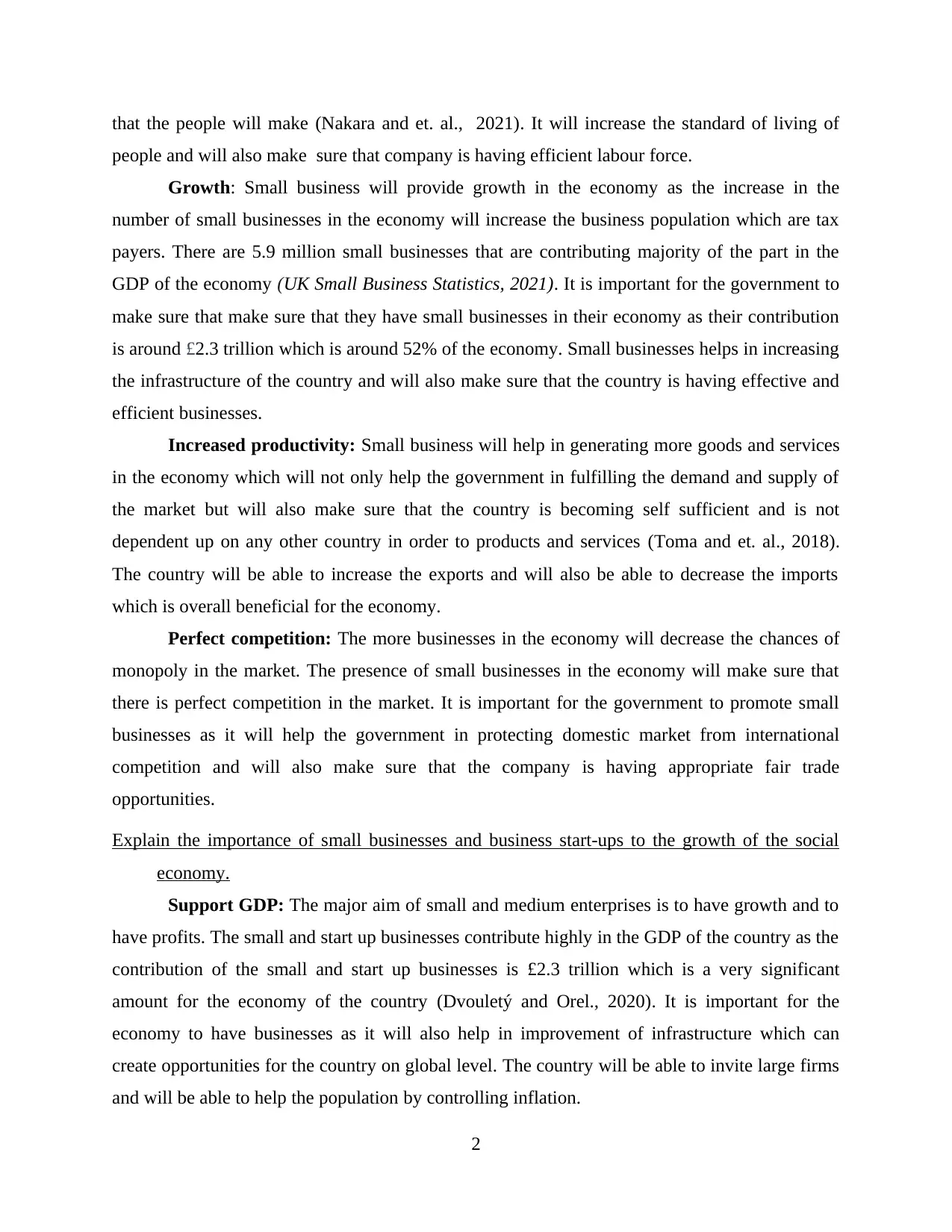
that the people will make (Nakara and et. al., 2021). It will increase the standard of living of
people and will also make sure that company is having efficient labour force.
Growth: Small business will provide growth in the economy as the increase in the
number of small businesses in the economy will increase the business population which are tax
payers. There are 5.9 million small businesses that are contributing majority of the part in the
GDP of the economy (UK Small Business Statistics, 2021). It is important for the government to
make sure that make sure that they have small businesses in their economy as their contribution
is around £2.3 trillion which is around 52% of the economy. Small businesses helps in increasing
the infrastructure of the country and will also make sure that the country is having effective and
efficient businesses.
Increased productivity: Small business will help in generating more goods and services
in the economy which will not only help the government in fulfilling the demand and supply of
the market but will also make sure that the country is becoming self sufficient and is not
dependent up on any other country in order to products and services (Toma and et. al., 2018).
The country will be able to increase the exports and will also be able to decrease the imports
which is overall beneficial for the economy.
Perfect competition: The more businesses in the economy will decrease the chances of
monopoly in the market. The presence of small businesses in the economy will make sure that
there is perfect competition in the market. It is important for the government to promote small
businesses as it will help the government in protecting domestic market from international
competition and will also make sure that the company is having appropriate fair trade
opportunities.
Explain the importance of small businesses and business start-ups to the growth of the social
economy.
Support GDP: The major aim of small and medium enterprises is to have growth and to
have profits. The small and start up businesses contribute highly in the GDP of the country as the
contribution of the small and start up businesses is £2.3 trillion which is a very significant
amount for the economy of the country (Dvouletý and Orel., 2020). It is important for the
economy to have businesses as it will also help in improvement of infrastructure which can
create opportunities for the country on global level. The country will be able to invite large firms
and will be able to help the population by controlling inflation.
2
people and will also make sure that company is having efficient labour force.
Growth: Small business will provide growth in the economy as the increase in the
number of small businesses in the economy will increase the business population which are tax
payers. There are 5.9 million small businesses that are contributing majority of the part in the
GDP of the economy (UK Small Business Statistics, 2021). It is important for the government to
make sure that make sure that they have small businesses in their economy as their contribution
is around £2.3 trillion which is around 52% of the economy. Small businesses helps in increasing
the infrastructure of the country and will also make sure that the country is having effective and
efficient businesses.
Increased productivity: Small business will help in generating more goods and services
in the economy which will not only help the government in fulfilling the demand and supply of
the market but will also make sure that the country is becoming self sufficient and is not
dependent up on any other country in order to products and services (Toma and et. al., 2018).
The country will be able to increase the exports and will also be able to decrease the imports
which is overall beneficial for the economy.
Perfect competition: The more businesses in the economy will decrease the chances of
monopoly in the market. The presence of small businesses in the economy will make sure that
there is perfect competition in the market. It is important for the government to promote small
businesses as it will help the government in protecting domestic market from international
competition and will also make sure that the company is having appropriate fair trade
opportunities.
Explain the importance of small businesses and business start-ups to the growth of the social
economy.
Support GDP: The major aim of small and medium enterprises is to have growth and to
have profits. The small and start up businesses contribute highly in the GDP of the country as the
contribution of the small and start up businesses is £2.3 trillion which is a very significant
amount for the economy of the country (Dvouletý and Orel., 2020). It is important for the
economy to have businesses as it will also help in improvement of infrastructure which can
create opportunities for the country on global level. The country will be able to invite large firms
and will be able to help the population by controlling inflation.
2
Secure Best Marks with AI Grader
Need help grading? Try our AI Grader for instant feedback on your assignments.
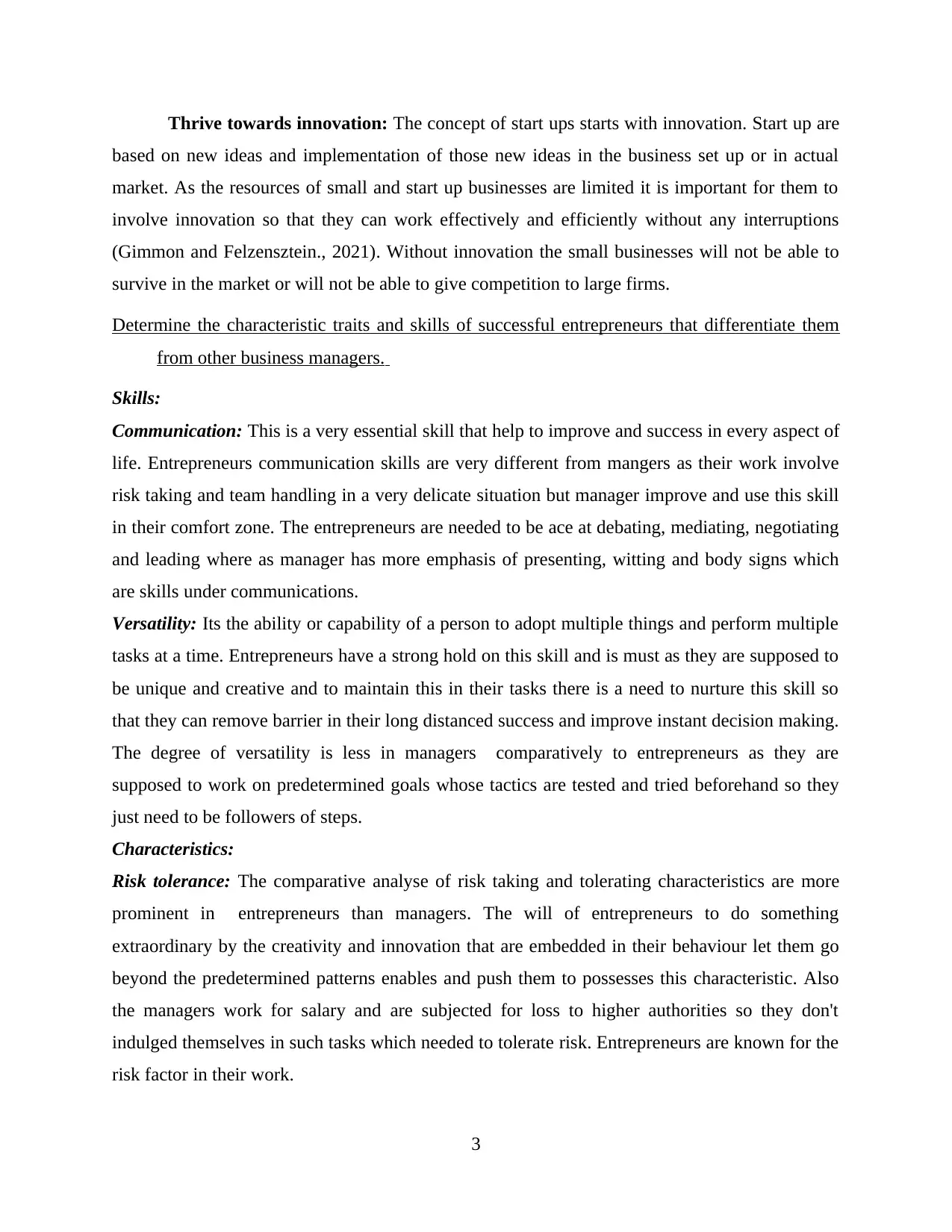
Thrive towards innovation: The concept of start ups starts with innovation. Start up are
based on new ideas and implementation of those new ideas in the business set up or in actual
market. As the resources of small and start up businesses are limited it is important for them to
involve innovation so that they can work effectively and efficiently without any interruptions
(Gimmon and Felzensztein., 2021). Without innovation the small businesses will not be able to
survive in the market or will not be able to give competition to large firms.
Determine the characteristic traits and skills of successful entrepreneurs that differentiate them
from other business managers.
Skills:
Communication: This is a very essential skill that help to improve and success in every aspect of
life. Entrepreneurs communication skills are very different from mangers as their work involve
risk taking and team handling in a very delicate situation but manager improve and use this skill
in their comfort zone. The entrepreneurs are needed to be ace at debating, mediating, negotiating
and leading where as manager has more emphasis of presenting, witting and body signs which
are skills under communications.
Versatility: Its the ability or capability of a person to adopt multiple things and perform multiple
tasks at a time. Entrepreneurs have a strong hold on this skill and is must as they are supposed to
be unique and creative and to maintain this in their tasks there is a need to nurture this skill so
that they can remove barrier in their long distanced success and improve instant decision making.
The degree of versatility is less in managers comparatively to entrepreneurs as they are
supposed to work on predetermined goals whose tactics are tested and tried beforehand so they
just need to be followers of steps.
Characteristics:
Risk tolerance: The comparative analyse of risk taking and tolerating characteristics are more
prominent in entrepreneurs than managers. The will of entrepreneurs to do something
extraordinary by the creativity and innovation that are embedded in their behaviour let them go
beyond the predetermined patterns enables and push them to possesses this characteristic. Also
the managers work for salary and are subjected for loss to higher authorities so they don't
indulged themselves in such tasks which needed to tolerate risk. Entrepreneurs are known for the
risk factor in their work.
3
based on new ideas and implementation of those new ideas in the business set up or in actual
market. As the resources of small and start up businesses are limited it is important for them to
involve innovation so that they can work effectively and efficiently without any interruptions
(Gimmon and Felzensztein., 2021). Without innovation the small businesses will not be able to
survive in the market or will not be able to give competition to large firms.
Determine the characteristic traits and skills of successful entrepreneurs that differentiate them
from other business managers.
Skills:
Communication: This is a very essential skill that help to improve and success in every aspect of
life. Entrepreneurs communication skills are very different from mangers as their work involve
risk taking and team handling in a very delicate situation but manager improve and use this skill
in their comfort zone. The entrepreneurs are needed to be ace at debating, mediating, negotiating
and leading where as manager has more emphasis of presenting, witting and body signs which
are skills under communications.
Versatility: Its the ability or capability of a person to adopt multiple things and perform multiple
tasks at a time. Entrepreneurs have a strong hold on this skill and is must as they are supposed to
be unique and creative and to maintain this in their tasks there is a need to nurture this skill so
that they can remove barrier in their long distanced success and improve instant decision making.
The degree of versatility is less in managers comparatively to entrepreneurs as they are
supposed to work on predetermined goals whose tactics are tested and tried beforehand so they
just need to be followers of steps.
Characteristics:
Risk tolerance: The comparative analyse of risk taking and tolerating characteristics are more
prominent in entrepreneurs than managers. The will of entrepreneurs to do something
extraordinary by the creativity and innovation that are embedded in their behaviour let them go
beyond the predetermined patterns enables and push them to possesses this characteristic. Also
the managers work for salary and are subjected for loss to higher authorities so they don't
indulged themselves in such tasks which needed to tolerate risk. Entrepreneurs are known for the
risk factor in their work.
3
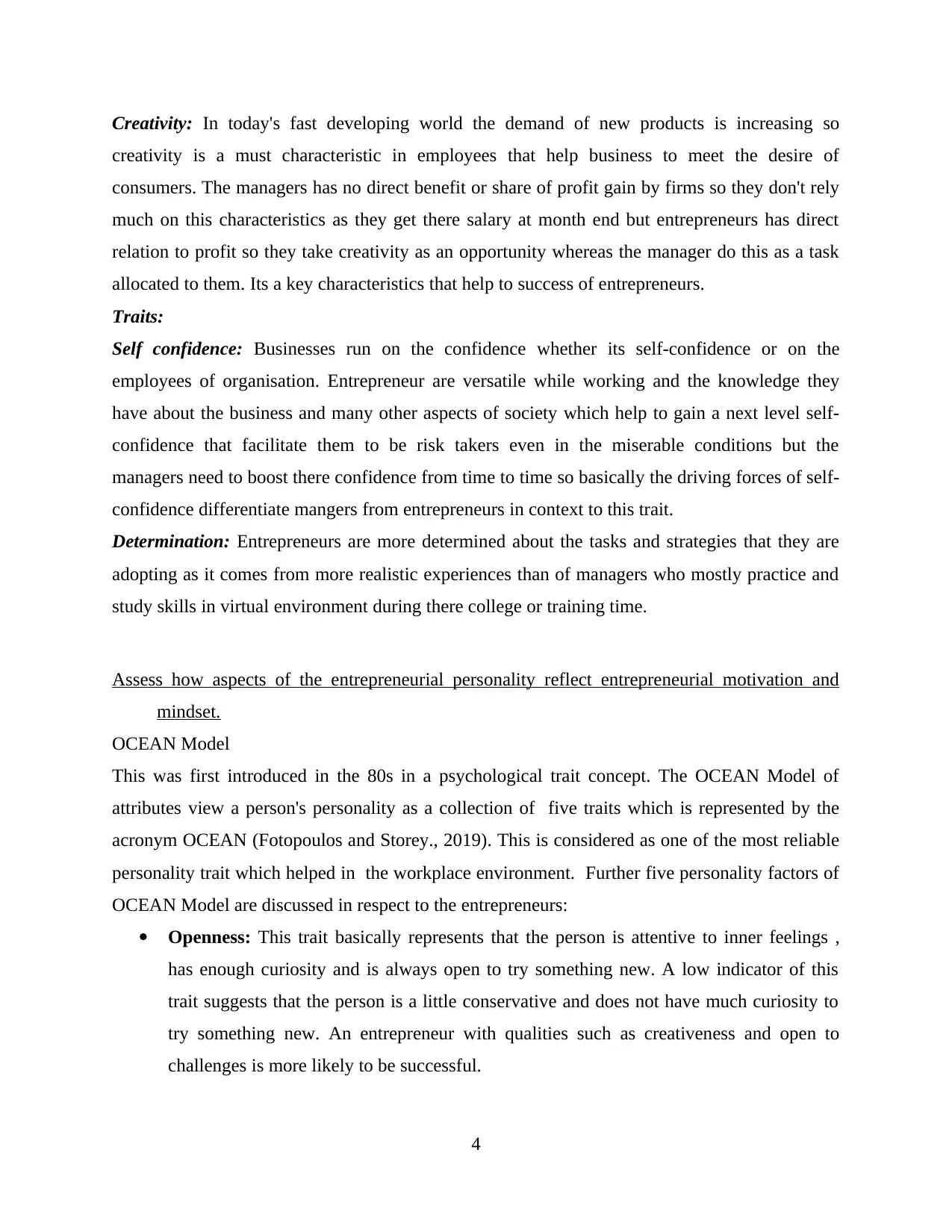
Creativity: In today's fast developing world the demand of new products is increasing so
creativity is a must characteristic in employees that help business to meet the desire of
consumers. The managers has no direct benefit or share of profit gain by firms so they don't rely
much on this characteristics as they get there salary at month end but entrepreneurs has direct
relation to profit so they take creativity as an opportunity whereas the manager do this as a task
allocated to them. Its a key characteristics that help to success of entrepreneurs.
Traits:
Self confidence: Businesses run on the confidence whether its self-confidence or on the
employees of organisation. Entrepreneur are versatile while working and the knowledge they
have about the business and many other aspects of society which help to gain a next level self-
confidence that facilitate them to be risk takers even in the miserable conditions but the
managers need to boost there confidence from time to time so basically the driving forces of self-
confidence differentiate mangers from entrepreneurs in context to this trait.
Determination: Entrepreneurs are more determined about the tasks and strategies that they are
adopting as it comes from more realistic experiences than of managers who mostly practice and
study skills in virtual environment during there college or training time.
Assess how aspects of the entrepreneurial personality reflect entrepreneurial motivation and
mindset.
OCEAN Model
This was first introduced in the 80s in a psychological trait concept. The OCEAN Model of
attributes view a person's personality as a collection of five traits which is represented by the
acronym OCEAN (Fotopoulos and Storey., 2019). This is considered as one of the most reliable
personality trait which helped in the workplace environment. Further five personality factors of
OCEAN Model are discussed in respect to the entrepreneurs:
Openness: This trait basically represents that the person is attentive to inner feelings ,
has enough curiosity and is always open to try something new. A low indicator of this
trait suggests that the person is a little conservative and does not have much curiosity to
try something new. An entrepreneur with qualities such as creativeness and open to
challenges is more likely to be successful.
4
creativity is a must characteristic in employees that help business to meet the desire of
consumers. The managers has no direct benefit or share of profit gain by firms so they don't rely
much on this characteristics as they get there salary at month end but entrepreneurs has direct
relation to profit so they take creativity as an opportunity whereas the manager do this as a task
allocated to them. Its a key characteristics that help to success of entrepreneurs.
Traits:
Self confidence: Businesses run on the confidence whether its self-confidence or on the
employees of organisation. Entrepreneur are versatile while working and the knowledge they
have about the business and many other aspects of society which help to gain a next level self-
confidence that facilitate them to be risk takers even in the miserable conditions but the
managers need to boost there confidence from time to time so basically the driving forces of self-
confidence differentiate mangers from entrepreneurs in context to this trait.
Determination: Entrepreneurs are more determined about the tasks and strategies that they are
adopting as it comes from more realistic experiences than of managers who mostly practice and
study skills in virtual environment during there college or training time.
Assess how aspects of the entrepreneurial personality reflect entrepreneurial motivation and
mindset.
OCEAN Model
This was first introduced in the 80s in a psychological trait concept. The OCEAN Model of
attributes view a person's personality as a collection of five traits which is represented by the
acronym OCEAN (Fotopoulos and Storey., 2019). This is considered as one of the most reliable
personality trait which helped in the workplace environment. Further five personality factors of
OCEAN Model are discussed in respect to the entrepreneurs:
Openness: This trait basically represents that the person is attentive to inner feelings ,
has enough curiosity and is always open to try something new. A low indicator of this
trait suggests that the person is a little conservative and does not have much curiosity to
try something new. An entrepreneur with qualities such as creativeness and open to
challenges is more likely to be successful.
4
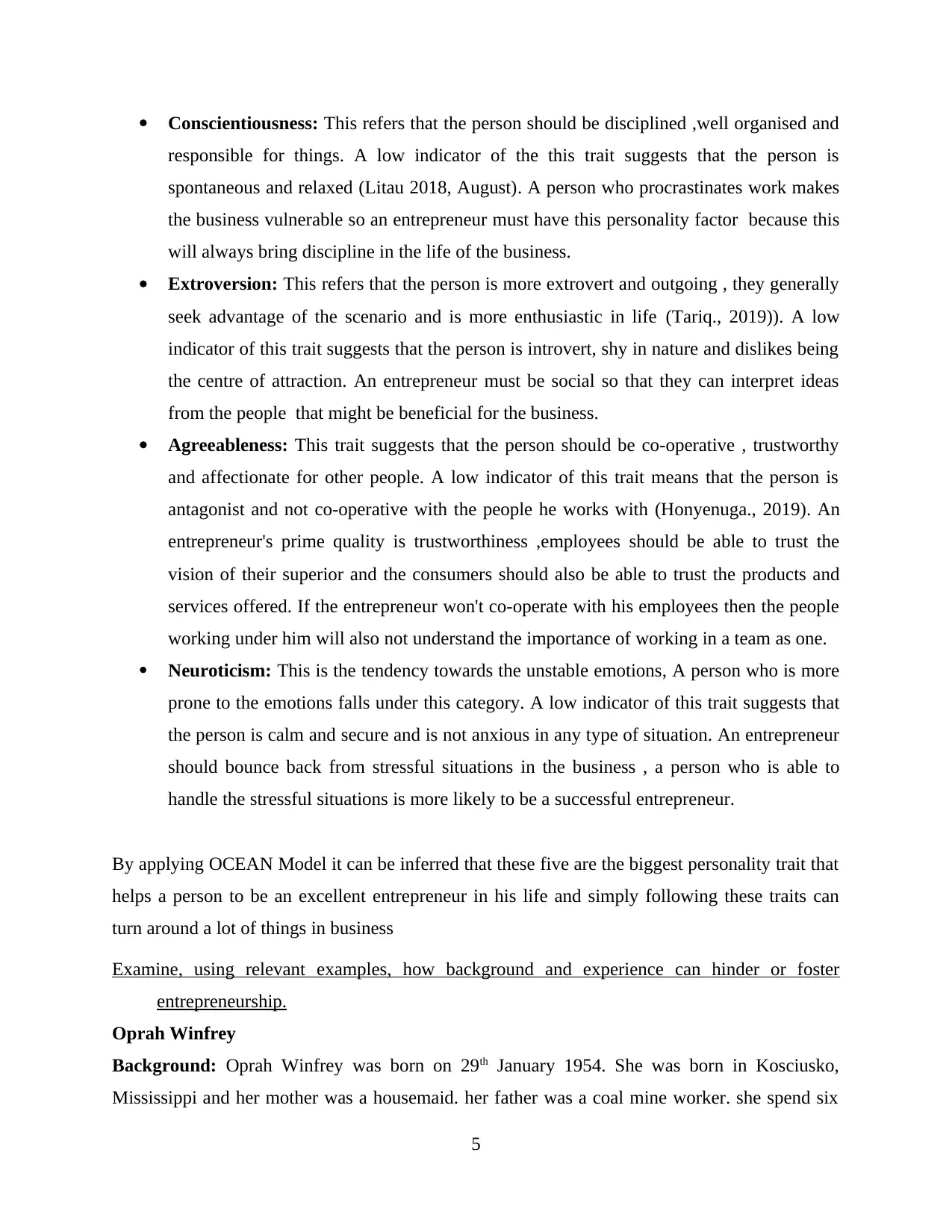
Conscientiousness: This refers that the person should be disciplined ,well organised and
responsible for things. A low indicator of the this trait suggests that the person is
spontaneous and relaxed (Litau 2018, August). A person who procrastinates work makes
the business vulnerable so an entrepreneur must have this personality factor because this
will always bring discipline in the life of the business.
Extroversion: This refers that the person is more extrovert and outgoing , they generally
seek advantage of the scenario and is more enthusiastic in life (Tariq., 2019)). A low
indicator of this trait suggests that the person is introvert, shy in nature and dislikes being
the centre of attraction. An entrepreneur must be social so that they can interpret ideas
from the people that might be beneficial for the business.
Agreeableness: This trait suggests that the person should be co-operative , trustworthy
and affectionate for other people. A low indicator of this trait means that the person is
antagonist and not co-operative with the people he works with (Honyenuga., 2019). An
entrepreneur's prime quality is trustworthiness ,employees should be able to trust the
vision of their superior and the consumers should also be able to trust the products and
services offered. If the entrepreneur won't co-operate with his employees then the people
working under him will also not understand the importance of working in a team as one.
Neuroticism: This is the tendency towards the unstable emotions, A person who is more
prone to the emotions falls under this category. A low indicator of this trait suggests that
the person is calm and secure and is not anxious in any type of situation. An entrepreneur
should bounce back from stressful situations in the business , a person who is able to
handle the stressful situations is more likely to be a successful entrepreneur.
By applying OCEAN Model it can be inferred that these five are the biggest personality trait that
helps a person to be an excellent entrepreneur in his life and simply following these traits can
turn around a lot of things in business
Examine, using relevant examples, how background and experience can hinder or foster
entrepreneurship.
Oprah Winfrey
Background: Oprah Winfrey was born on 29th January 1954. She was born in Kosciusko,
Mississippi and her mother was a housemaid. her father was a coal mine worker. she spend six
5
responsible for things. A low indicator of the this trait suggests that the person is
spontaneous and relaxed (Litau 2018, August). A person who procrastinates work makes
the business vulnerable so an entrepreneur must have this personality factor because this
will always bring discipline in the life of the business.
Extroversion: This refers that the person is more extrovert and outgoing , they generally
seek advantage of the scenario and is more enthusiastic in life (Tariq., 2019)). A low
indicator of this trait suggests that the person is introvert, shy in nature and dislikes being
the centre of attraction. An entrepreneur must be social so that they can interpret ideas
from the people that might be beneficial for the business.
Agreeableness: This trait suggests that the person should be co-operative , trustworthy
and affectionate for other people. A low indicator of this trait means that the person is
antagonist and not co-operative with the people he works with (Honyenuga., 2019). An
entrepreneur's prime quality is trustworthiness ,employees should be able to trust the
vision of their superior and the consumers should also be able to trust the products and
services offered. If the entrepreneur won't co-operate with his employees then the people
working under him will also not understand the importance of working in a team as one.
Neuroticism: This is the tendency towards the unstable emotions, A person who is more
prone to the emotions falls under this category. A low indicator of this trait suggests that
the person is calm and secure and is not anxious in any type of situation. An entrepreneur
should bounce back from stressful situations in the business , a person who is able to
handle the stressful situations is more likely to be a successful entrepreneur.
By applying OCEAN Model it can be inferred that these five are the biggest personality trait that
helps a person to be an excellent entrepreneur in his life and simply following these traits can
turn around a lot of things in business
Examine, using relevant examples, how background and experience can hinder or foster
entrepreneurship.
Oprah Winfrey
Background: Oprah Winfrey was born on 29th January 1954. She was born in Kosciusko,
Mississippi and her mother was a housemaid. her father was a coal mine worker. she spend six
5
Paraphrase This Document
Need a fresh take? Get an instant paraphrase of this document with our AI Paraphraser
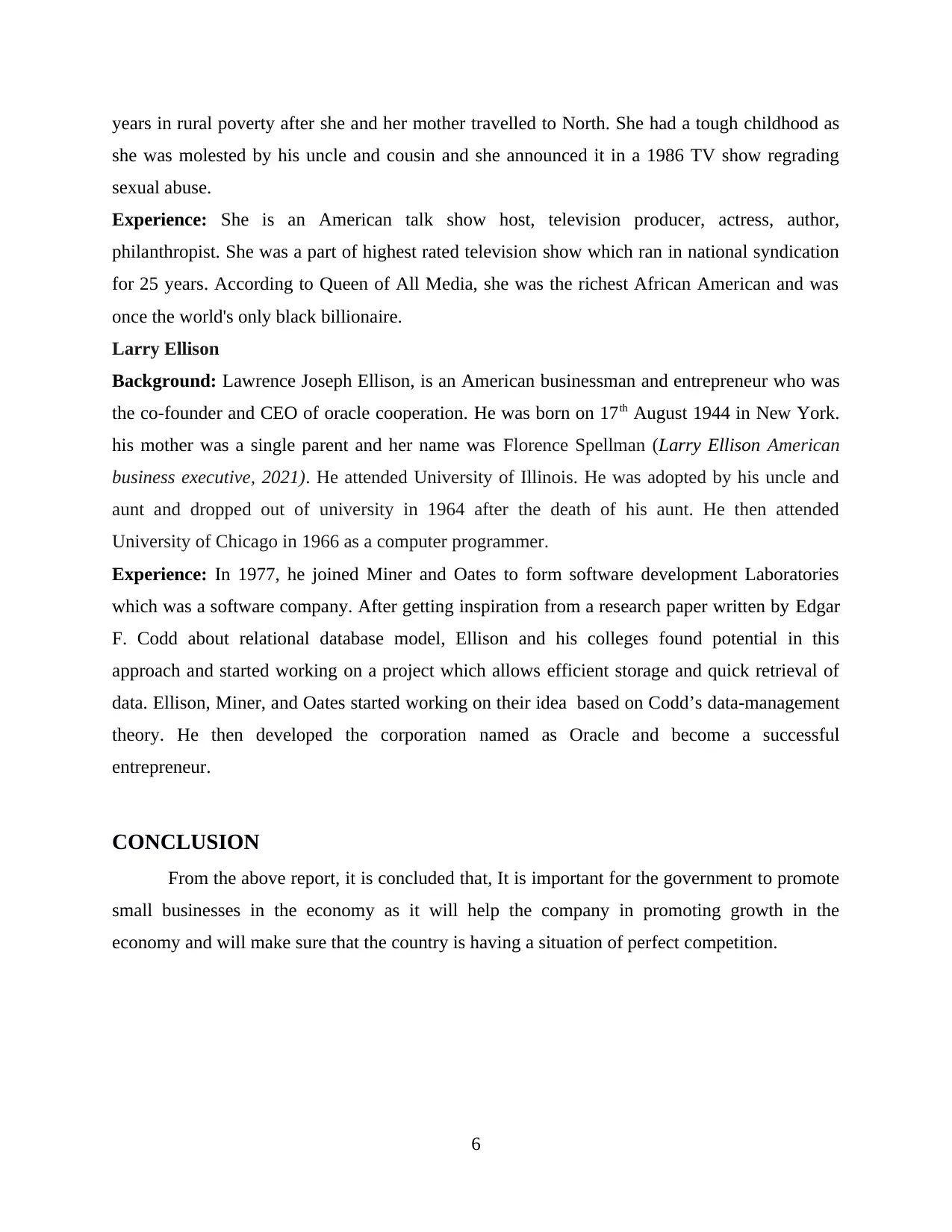
years in rural poverty after she and her mother travelled to North. She had a tough childhood as
she was molested by his uncle and cousin and she announced it in a 1986 TV show regrading
sexual abuse.
Experience: She is an American talk show host, television producer, actress, author,
philanthropist. She was a part of highest rated television show which ran in national syndication
for 25 years. According to Queen of All Media, she was the richest African American and was
once the world's only black billionaire.
Larry Ellison
Background: Lawrence Joseph Ellison, is an American businessman and entrepreneur who was
the co-founder and CEO of oracle cooperation. He was born on 17th August 1944 in New York.
his mother was a single parent and her name was Florence Spellman (Larry Ellison American
business executive, 2021). He attended University of Illinois. He was adopted by his uncle and
aunt and dropped out of university in 1964 after the death of his aunt. He then attended
University of Chicago in 1966 as a computer programmer.
Experience: In 1977, he joined Miner and Oates to form software development Laboratories
which was a software company. After getting inspiration from a research paper written by Edgar
F. Codd about relational database model, Ellison and his colleges found potential in this
approach and started working on a project which allows efficient storage and quick retrieval of
data. Ellison, Miner, and Oates started working on their idea based on Codd’s data-management
theory. He then developed the corporation named as Oracle and become a successful
entrepreneur.
CONCLUSION
From the above report, it is concluded that, It is important for the government to promote
small businesses in the economy as it will help the company in promoting growth in the
economy and will make sure that the country is having a situation of perfect competition.
6
she was molested by his uncle and cousin and she announced it in a 1986 TV show regrading
sexual abuse.
Experience: She is an American talk show host, television producer, actress, author,
philanthropist. She was a part of highest rated television show which ran in national syndication
for 25 years. According to Queen of All Media, she was the richest African American and was
once the world's only black billionaire.
Larry Ellison
Background: Lawrence Joseph Ellison, is an American businessman and entrepreneur who was
the co-founder and CEO of oracle cooperation. He was born on 17th August 1944 in New York.
his mother was a single parent and her name was Florence Spellman (Larry Ellison American
business executive, 2021). He attended University of Illinois. He was adopted by his uncle and
aunt and dropped out of university in 1964 after the death of his aunt. He then attended
University of Chicago in 1966 as a computer programmer.
Experience: In 1977, he joined Miner and Oates to form software development Laboratories
which was a software company. After getting inspiration from a research paper written by Edgar
F. Codd about relational database model, Ellison and his colleges found potential in this
approach and started working on a project which allows efficient storage and quick retrieval of
data. Ellison, Miner, and Oates started working on their idea based on Codd’s data-management
theory. He then developed the corporation named as Oracle and become a successful
entrepreneur.
CONCLUSION
From the above report, it is concluded that, It is important for the government to promote
small businesses in the economy as it will help the company in promoting growth in the
economy and will make sure that the country is having a situation of perfect competition.
6
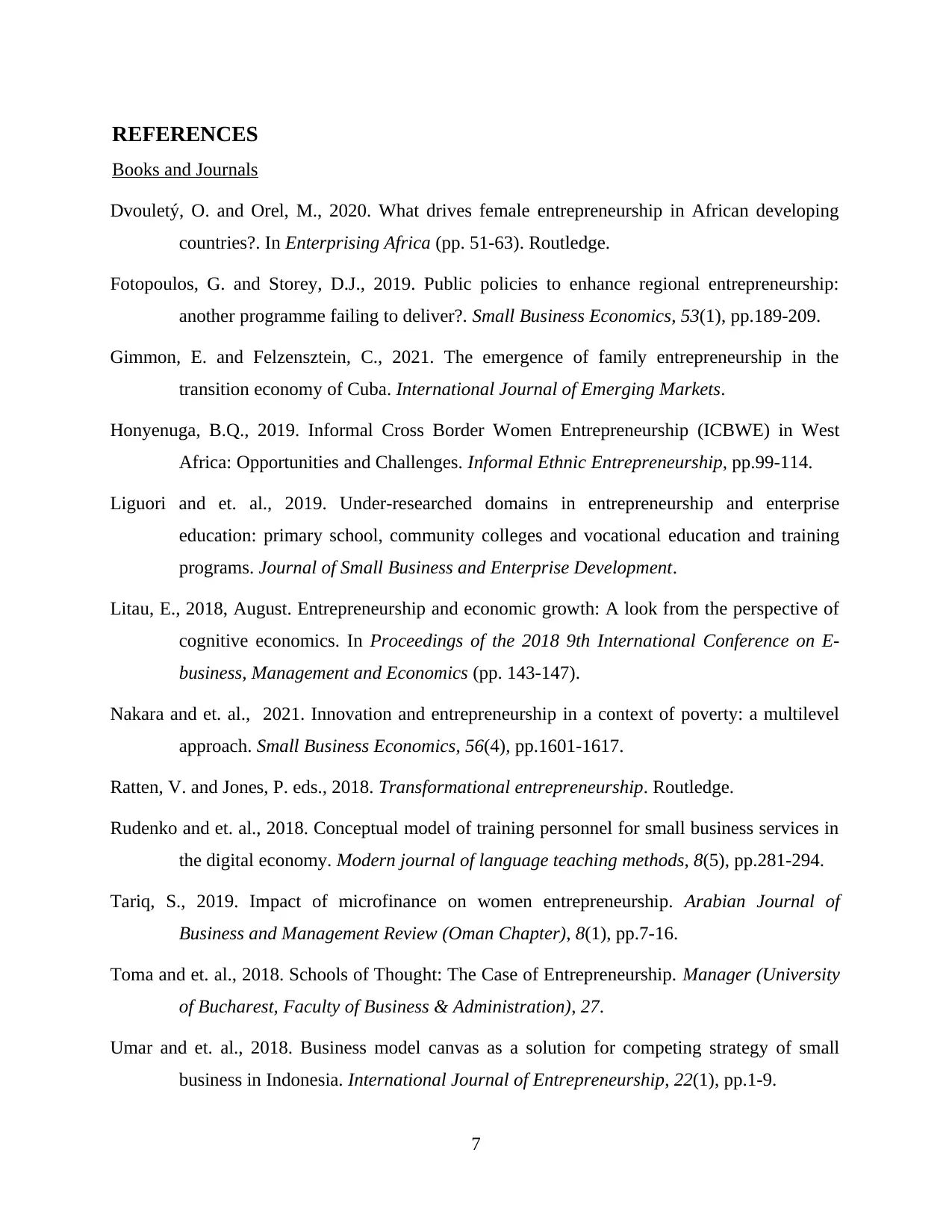
REFERENCES
Books and Journals
Dvouletý, O. and Orel, M., 2020. What drives female entrepreneurship in African developing
countries?. In Enterprising Africa (pp. 51-63). Routledge.
Fotopoulos, G. and Storey, D.J., 2019. Public policies to enhance regional entrepreneurship:
another programme failing to deliver?. Small Business Economics, 53(1), pp.189-209.
Gimmon, E. and Felzensztein, C., 2021. The emergence of family entrepreneurship in the
transition economy of Cuba. International Journal of Emerging Markets.
Honyenuga, B.Q., 2019. Informal Cross Border Women Entrepreneurship (ICBWE) in West
Africa: Opportunities and Challenges. Informal Ethnic Entrepreneurship, pp.99-114.
Liguori and et. al., 2019. Under-researched domains in entrepreneurship and enterprise
education: primary school, community colleges and vocational education and training
programs. Journal of Small Business and Enterprise Development.
Litau, E., 2018, August. Entrepreneurship and economic growth: A look from the perspective of
cognitive economics. In Proceedings of the 2018 9th International Conference on E-
business, Management and Economics (pp. 143-147).
Nakara and et. al., 2021. Innovation and entrepreneurship in a context of poverty: a multilevel
approach. Small Business Economics, 56(4), pp.1601-1617.
Ratten, V. and Jones, P. eds., 2018. Transformational entrepreneurship. Routledge.
Rudenko and et. al., 2018. Conceptual model of training personnel for small business services in
the digital economy. Modern journal of language teaching methods, 8(5), pp.281-294.
Tariq, S., 2019. Impact of microfinance on women entrepreneurship. Arabian Journal of
Business and Management Review (Oman Chapter), 8(1), pp.7-16.
Toma and et. al., 2018. Schools of Thought: The Case of Entrepreneurship. Manager (University
of Bucharest, Faculty of Business & Administration), 27.
Umar and et. al., 2018. Business model canvas as a solution for competing strategy of small
business in Indonesia. International Journal of Entrepreneurship, 22(1), pp.1-9.
7
Books and Journals
Dvouletý, O. and Orel, M., 2020. What drives female entrepreneurship in African developing
countries?. In Enterprising Africa (pp. 51-63). Routledge.
Fotopoulos, G. and Storey, D.J., 2019. Public policies to enhance regional entrepreneurship:
another programme failing to deliver?. Small Business Economics, 53(1), pp.189-209.
Gimmon, E. and Felzensztein, C., 2021. The emergence of family entrepreneurship in the
transition economy of Cuba. International Journal of Emerging Markets.
Honyenuga, B.Q., 2019. Informal Cross Border Women Entrepreneurship (ICBWE) in West
Africa: Opportunities and Challenges. Informal Ethnic Entrepreneurship, pp.99-114.
Liguori and et. al., 2019. Under-researched domains in entrepreneurship and enterprise
education: primary school, community colleges and vocational education and training
programs. Journal of Small Business and Enterprise Development.
Litau, E., 2018, August. Entrepreneurship and economic growth: A look from the perspective of
cognitive economics. In Proceedings of the 2018 9th International Conference on E-
business, Management and Economics (pp. 143-147).
Nakara and et. al., 2021. Innovation and entrepreneurship in a context of poverty: a multilevel
approach. Small Business Economics, 56(4), pp.1601-1617.
Ratten, V. and Jones, P. eds., 2018. Transformational entrepreneurship. Routledge.
Rudenko and et. al., 2018. Conceptual model of training personnel for small business services in
the digital economy. Modern journal of language teaching methods, 8(5), pp.281-294.
Tariq, S., 2019. Impact of microfinance on women entrepreneurship. Arabian Journal of
Business and Management Review (Oman Chapter), 8(1), pp.7-16.
Toma and et. al., 2018. Schools of Thought: The Case of Entrepreneurship. Manager (University
of Bucharest, Faculty of Business & Administration), 27.
Umar and et. al., 2018. Business model canvas as a solution for competing strategy of small
business in Indonesia. International Journal of Entrepreneurship, 22(1), pp.1-9.
7
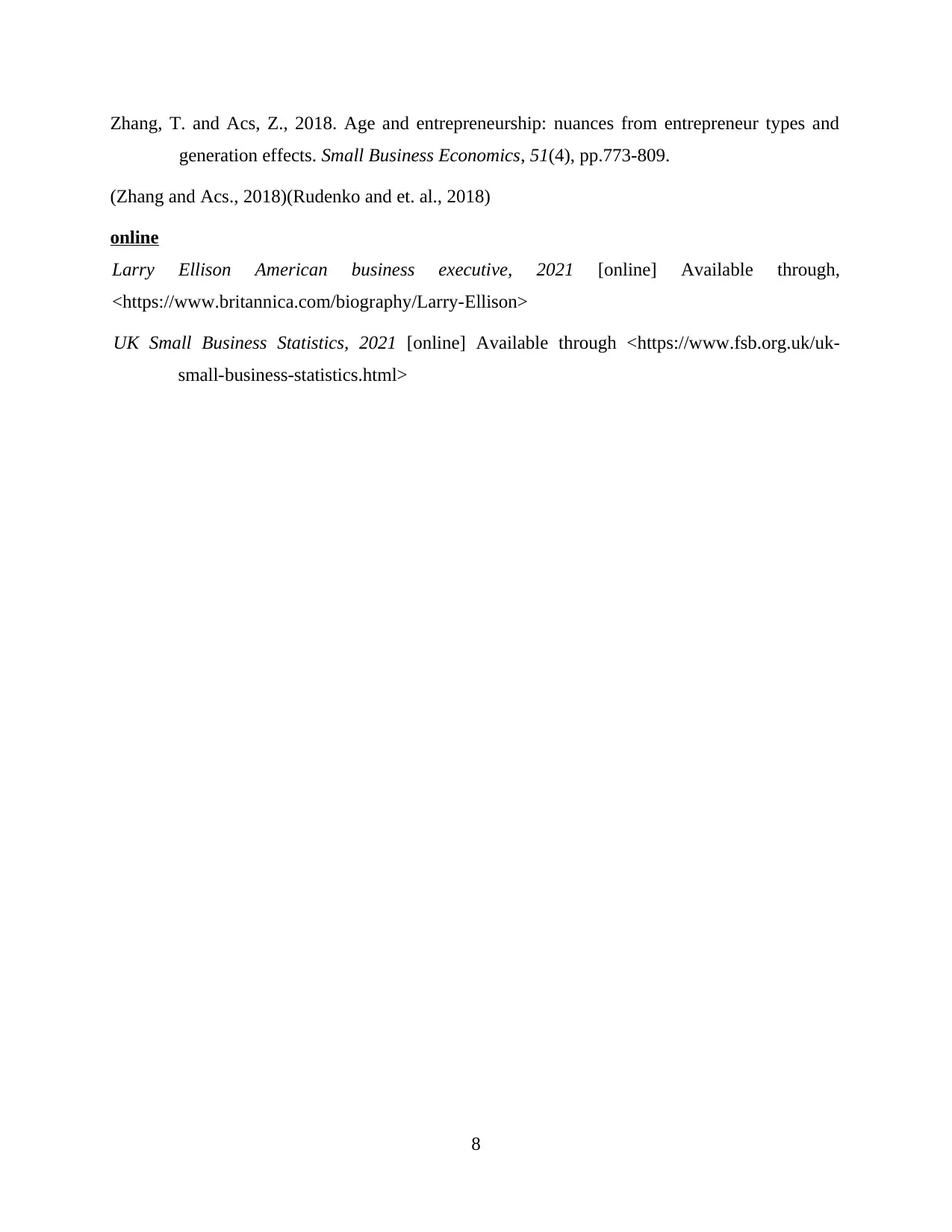
Zhang, T. and Acs, Z., 2018. Age and entrepreneurship: nuances from entrepreneur types and
generation effects. Small Business Economics, 51(4), pp.773-809.
(Zhang and Acs., 2018)(Rudenko and et. al., 2018)
online
Larry Ellison American business executive, 2021 [online] Available through,
<https://www.britannica.com/biography/Larry-Ellison>
UK Small Business Statistics, 2021 [online] Available through <https://www.fsb.org.uk/uk-
small-business-statistics.html>
8
generation effects. Small Business Economics, 51(4), pp.773-809.
(Zhang and Acs., 2018)(Rudenko and et. al., 2018)
online
Larry Ellison American business executive, 2021 [online] Available through,
<https://www.britannica.com/biography/Larry-Ellison>
UK Small Business Statistics, 2021 [online] Available through <https://www.fsb.org.uk/uk-
small-business-statistics.html>
8
Secure Best Marks with AI Grader
Need help grading? Try our AI Grader for instant feedback on your assignments.

9
1 out of 11
Related Documents
Your All-in-One AI-Powered Toolkit for Academic Success.
+13062052269
info@desklib.com
Available 24*7 on WhatsApp / Email
![[object Object]](/_next/static/media/star-bottom.7253800d.svg)
Unlock your academic potential
© 2024 | Zucol Services PVT LTD | All rights reserved.





